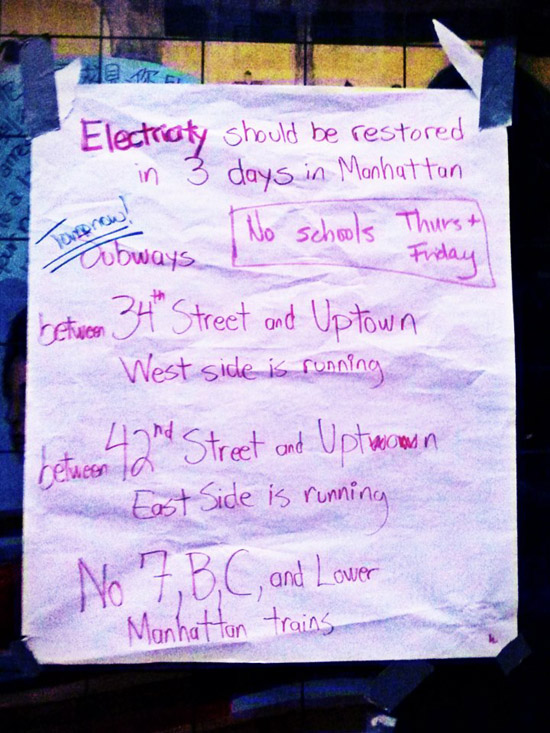
Daily tracking polls – and there are many – estimate the number of still undecided voters heading into this last weekend before the election hovering between 3 and 7%. That’s an astonishingly high number and even if half these voters are “undecided” merely because they crave media attention, in a race labeled a dead heat, even ½ of 1% could be decisive, especially in swing states.
For those voting strictly along party or ideological lines, the choice is clear. But for independents who vote more pragmatically, haunting indecision is an understandable reaction. Campaigns have always had their share of misrepresentations, deceptive advertising, the twisting of facts to suit particular messages or candidates, and outright lies. But never more so than this year, when the clear waters of choice have been muddied by the unprecedented amount of special interest money flooded into the race courtesy of Citizens United. Money used to fire a barrage of advertisements, commercials, direct mailing, and robocalls unparalleled in history, leaving the electorate overwhelmed, disoriented, and confused.
So let’s bullet point some of the more important issues – some hotly debated, others hardly mentioned at all – keeping it brief, simple, and factual.
The Economic Recovery:
According to TIGER (Tracking Indices for the Global Economic Recovery), the U.S. economy is “the sole bright spot” in a sluggish world economy.
“The global economic recovery is on the ropes, battered by political conflicts within and across countries, lack of decisive policy actions, and governments’ inability to tackle deep-seated problems, such as unsustainable public finances that are stifling growth,” their report states. “The U.S. economy remains the sole bright spot, with economic activity, employment and financial markets all showing unexpected although still modest strength.”
Think about that – in a worldwide cascade of drowning nations, and under the guidance of the Obama administration, the U.S. is the only one staying afloat.
In comparison, those countries following the Romney/Ryan plan of extreme austerity are sinking faster than a mob informer wearing cement overshoes.
The Debt:
For the last four years, the question of what to do about our almost $16 trillion of debt has caused much division and the rise of the Tea Party. Too often forgotten in all the hullabaloo is the fact that the Democratic Clinton administration ended its term in office with a huge surplus which the Republican Bush/Cheney administration turned into a devastating deficit, bringing the entire world to the edge of financial disaster. The debt added by the Obama administration occurred mostly through the much-needed economic stimulus, and spending on our infrastructure and social programs.
As our slow but successful recovery proves, the money spent of the stimulus allowed the U.S. to stand out as the only shining light in the world economy.
As for money spent on our infrastructure and social programs, the first not only provided jobs but much needed repair on our roads, bridges, buildings, and highways while the second supported the very survival of those Americans hardest hit by the financial crisis.
Last weekend on Up with Chris Hayes, Ilyse Hogue of The Nation neatly clarified our two choices in handling the debt. We can clear our debt ASAP by expediting payments to China and Wall Street – our two biggest creditors – or we can invest in our own future – in education and training, in rebuilding our vital infrastructure, and by stimulating growth – while paying down our debt on a sustainable schedule.
Obama/Biden proposes investing in America’s future by cutting costs and raising taxes on the richest 2%.
Romney/Ryan wants to clear the debt quickly, so long as our wealthiest citizens and corporations are not taxed even one extra penny, by cutting education and social programs. They also want to cut funding to the arts, particularly PBS, despite the fact that Elmo of Sesame Street played a vital role in calming children during Superstorm Sandy.
Jobs:
850,000 jobs per month were lost during the last year of the Bush administration which, along with the mortgage and debt crises, brought our country to the precipice of another Great Depression. Recovery was understandably slow, but starting in February, 2010, the Obama Presidency has added jobs each month since, despite the fact that House Republicans have killed every single Jobs Act proposed. Last month, House Republicans even rejected the Veteran’s Jobs Act which would have provided training and jobs for 20,000 veterans returning from Iraq and Afghanistan.
Romney/Ryan has promised more jobs with more tax cuts, just as Bush did. But the Senate Research Committee released a study this past September which incontrovertibly showed that cutting taxes for the rich does not increase jobs. Senate Republicans squashed the report and it was leaked only this past week. Yet both Romney and Ryan kept hitting the stump with the same old trickle-down economics theory that has failed on a grand scale everywhere it’s been implemented.
Healthcare:
Obama instituted the Affordable Care Act and Patient Protection program, commonly called Obamacare, which eventually provides healthcare to every American, allows those with pre-existing conditions to be covered, and, importantly, cuts the costs of the programs. He supports Medicare, Title X, and Medicaid.
Romney intends to repeal Obamacare and go back to the insurance-run health programs that led to the explosive run-up in health care costs and 50 million uninsured Americans. He wants to replace Medicare with a voucher system –and vouchers will not help get you covered if you have a pre-existing condition. He also wants to hand responsibility of Medicaid to the individual states and eliminate Title X, a program that delivers comprehensive care to the poor.
Social Security:
Obama/Biden support Social Security and want to expand funding by raising the limit of employee contributions.
Romney/Ryan want to privatize Social Security without explaining what would have happened to those accounts during both the 2000 dot.com crash and the 2008 Bush/Cheney financial disaster.
Supreme Court:
At least three of our aging Supreme Court justices will retire in the next four years, most likely Ginsburg (79), Breyer (74), and Kennedy (75). Ginsburg and Breyer are often labeled liberal justices, while Kennedy has been rightly or wrongly considered the swing vote between the 4 conservatives and the 4 liberals.
If Obama selects the replacements, the Court would remain about the same, perhaps giving the so-called liberal justices a 5-4 advantage.
If Romney is elected, he would appoint solidly conservative justices, probably in their late 40s or early 50s, giving the Court a 7-2 plurality of conservative judges for years to come.
Human Rights:
Obama/Biden pledge equal rights for all Americans, regardless of race, color, and creed.
Romney/Ryan hope to kill the Equal Rights Act, the Voting Act of 1965, college grants, arts grants, and social programs that help seniors, minorities, and the poor. They also seek to place into law the Defense of Marriage Act, a constitutional provision that would define marriage strictly as a union between a man and a woman (no LGBTs need apply).
Religion:
Obama/Biden stands by the 1st Amendment right of Freedom of Religion, allowing all to practice their own personal spiritual choices without government interference.
Led by the Religious Right, Republicans want to introduce into law wide-ranging faith-based policies born of extreme Christian doctrine.
Women:
Women’s issues would normally come under Human Rights, but the Republican War on Women makes it a separate category in this election cycle.
Obama/Biden support all women’s rights and claims of equal status, including the right to preventative healthcare and the right of choice over their own bodies.
Romney/Ryan advocates repeal of the Lilly Ledbetter Fair Pay Act that mandates equal pay for equal work for women (and all minorities). They support the Religious Right in ordering government control over women’s bodies. And Republicans engage in frequent sexist invective to put women in their place. For a fuller assessment of their stand, read this short post on the War on Women.
Disaster Relief:
Especially in light of Hurricane Sandy this past week, it’s important to emphasize that the Obama administration has rebuilt and streamlined FEMA to not only respond to natural disasters but to prepare for them as well.
Romney/Ryan plan to dismantle FEMA and put individual states in charge of their own relief. This would, of course, give rise to uneven programs – some good, some bad – but none with the resources of the federal government. And, too, how does a state even initiate disaster response when its entire infrastructure has been destroyed? Other Republicans, like Eric Cantor, want to fund disaster relief only if it’s paid for in advance, as long as none of this money comes from the upper 2%.
The Environment:
Obama has pledged to fiercely combat Climate Change by sparking the birth of Alternative Energy Sources – and his administration has done just that, investing in clean, renewable, and sustainable energy projects. Some, like Solyndra, have failed, but his success rate of 93% is extraordinarily high for start-up companies. Indeed, it’s far better than the 80% success rate Romney had investing in already going concerns businesses for Bain Capital, even counting all the jobs Romney slashed or moved overseas to increase his own profit.
Neither Romney nor Ryan are convinced that Climate Change is real, and therein is a huge problem.
The War on Terror:
After 9/11, the Bush/Cheney administration over-reacted to such an extent that a new National Security nation was born within our borders – a true Orwellian nightmare.
Most troubling was both the use and potential abuse of NDAA (National Defense Authorization Act) – allowing troubling practices such as rendition, indefinite detention, “enhanced interrogation,” and even assassination – alongside surveillance programs such as Trapwire, and the deployment of drones.
An old maxim states that leaders of countries never give up powers they have inherited from others. So the electorate must judge how each candidate might use those powers in the future – and in whose hands they might be used with the least potential for harm.
While there has been far too much collateral damage from the use of drone air strikes, we’re out of Iraq and we’ll be out of Afghanistan in 2014 – so it appears as if Obama is using these powers to shorten and end our involvement in these wars. And, too, Obama initiated and signed a START treaty with Russia that greatly reduced the number of nuclear weapons in both arsenals. He has also pledged to reduce all U.S. nuclear weapons by an astounding 80%, cutting our stockpile back to a level we haven’t seen since the 1950s. Plus, his projected budget cuts Defense spending.
Romney, on the other hand, is surrounded by the same neo-con advisors that served Bush and the Cheney/Halliburton combine. He has promised to dramatically increase Defense spending by as much as 40% and has already said we should confront Iran militarily.
So Obama – a man working toward a streamlined military – sounds like a much more responsible caretaker of these dangerous powers than Romney, who clearly wants to expand them.
Foreign Policy:
As has been clear for the last five years, Obama is respected as a global leader with integrity and credibility. He has improved relations with countries that Bush and Cheney insulted, and has worked in efficient partnership with many nations.
Romney, on the other hand, embarrassed himself everywhere he went on this past summer’s overseas trip. He knows absolutely nothing about foreign affairs, even claiming Russia is our fiercest enemy, and has insulted The U.K., China, Japan, and almost every other nation he talks about.
Platforms:
If you think your country’s future is worth an hour or two of your time, read the platforms of both the Democrats and Republicans. Each one cuts through the verbal hijinks of candidates on every level by specifically stating party positions.
After reading these documents, if you still cannot divine the differences between the parties, or if you do understand all the variances but are still ambivalent, give it up – you probably shouldn’t cast a ballot you may later regret.
But since this election may very well define our destiny, the rest of you must decide which direction you want your country to take…and vote.































